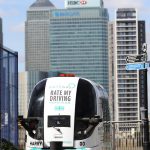 Joseph Schumpeter famously summarized innovation as a gale of creative destruction that blows out the old and heralds in the new. Nowhere are these winds more evident than in the car industry.
Joseph Schumpeter famously summarized innovation as a gale of creative destruction that blows out the old and heralds in the new. Nowhere are these winds more evident than in the car industry.
Whether it’s startups such as Uber and Tesla, or giants from other fields such as Google and Apple, the mobility sector is one that is seeing an awful lot of action. How are the big incumbents attempting to stay on top of things?
Back in 2016 BMW launched it’s Innovation Lab to try and better engage with startups in one of the three core BMW divisions: Financial Services, fleet manager Alphabet, and the core car group. The idea is to work closely with innovative companies from outside of BMW to ensure they stay on top of the latest trends.
They recently announced the latest cohort of five startups who will enjoy a 10-week residency at the Lab to work on their products and services, before then pitching them to senior BMW executives later this spring.
From a pool of 143 applicants from 36 countries, five were eventually shortlisted to participate in the Lab:
- Proximo.io – a location data platform that provides better engagement and marketing opportunities to their customers through geo-targeting
- Ocasta – a digital service studio, creators of the Oplift product suite for employee engagement, learning and operations
- Overfit Technologies – an employee retention and analytics platform which uses data mapping to help businesses make the most out of data
- easyCar Club – peer-to-peer car and van hire service with more than 10,000 members, it allows vehicle owners to earn money from their car or van when they are not using it
- DOVU – using blockchain technology, DOVU offers DOV tokens that users can earn and spend by sharing and changing the way they travel
The project aims to build upon a successful first year, which saw 4 of the 5 startups onboarded onto various BMW commercial divisions and therefore adopted more widely into BMW offerings.
Smart mobility
Or you have the (relatively) new innovation office Ford have opened in the east end of London at the Here East innovation facility. The site, which formally housed the London 2012 Olympic Games media centre, is home to a range of startups, universities and big corporates.
The facility, which opened at the end of last year features companies such as Ford and BT Sport alongside a host of startups and universities including Loughborough and University College London (UCL).
“Here East is unique in providing the space and infrastructure for entrepreneurs, global businesses and academics to come together and collaborate in the pursuit of innovation. Ford’s decision to join our community of innovators, start-ups and tech specialists as part of its drive to find smarter urban mobility solutions is an exciting development for the entire campus,” Gavin Pool, CEO, Here East says.
Innovative ecosystems
I’ve written before about the potential of such ecosystems to help the best ideas make their way to market, regardless of whether those ideas derive from the startup world or academia. It’s dangerous to adopt a ‘build it and innovation shall come’ mindset however, as the risk of failure is significant.
Indeed, one study of incubators and accelerators in Britain, Germany and the United States found that the environments were not motivating at all for startups, and almost did more harm than good for their growth prospects.
Not only do sponsors often regard the incubator as proof of their innovation prowess, but startups often regard acceptance into the incubator as job done. There is a profound risk of regarding building something or being accepted onto a program as being successful, when the hard work has only just begun.
If we are to innovate successfully then we not only need to appreciate that it’s hard work, but we also need to be candid in how we report the results of our work. It’s much better to own up to less than stellar results, if that’s what they are, than to kid ourselves that everything is going well.
Perhaps lessons can be learned from the progress made by General Motors. The company, which for years was a byword for anything but innovation, recently topped out the Navigant Research scorecard for autonomous technologies, beating not only established companies like Ford and BMW, but also the challengers like Tesla, Waymo and Uber.
This is likely due to the insights they have gained from being one of the first to market with the Bolt electric vehicle, whilst they have also made the hefty $1bn investment in AI startup Cruise back in 2016. By being able to combine the large-scale manufacturing knowledge they’ve had for decades with advanced work with new technologies, the company is justifiably at the head of the pack.
Time will tell how effective the strategies adopted by rivals such as BMW and Ford will be in making up lost ground and fighting off not only nimble upstarts but agile incumbents too.